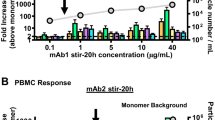Abstract
A cytokine which augments the expression of major histocompatibility complex (MHC) I antigens on K562 and gastric carcinoma tumour (HR) cells, has been isolated from the culture supernatant of Concanavalin-A (Con-A) activated human peripheral blood mononuclear cells. The factor, termed MHC augmenting factor (MHC- AF) has been partially purified by Sephadex G- 100 column chromatography, preparative isoelectric focusing and HPLC with ion- exchange as well as sizing columns. MHC-AF activity is associated with a 35 kDa molecule which has pI of 6.0. Interferon (IFN)-α, \, tumour necrosis factor (TNF), Interleukin (IL)-2, IL-4, IL-5 and IL-7 had no significant effect in MHC- AF bioassay, but IFN-γ had significant MHC-AF activity. Antibodies to IFN-α, IFN-\ and TNF-α did not block the activity of MHC-AF, but anti-IFN-y antibodies could partially neutralize the activity. However, unlike IFN-γ, MHC-AF activity was resistant to pH 2.0 treatment. Purified MHC-AF preparations did not have any activity in WISH cell/encephalo myocarditis virus (EMC) IFN bioassays. In addition, anti-IFN-y affinity column did not retain MHC-AF activity. These results indicate that a MHC-AF distinct from IFN-γ, is produced by activated human mononuclear cells.
Similar content being viewed by others
References
Boyum A 1974 Separation of blood leukocytes, granulocytes and lymphocytes;Tissue Antigens 4 269–274
Dokhelar M, Crrosson D, Wakasugi H, Tabilio A, Testa U, Vainchenkar W and Tursz T 1984 K562 cells induced to differentiate by phorbol tumor promoters resist NK lysis;Cell. lmmunol. 87 389–399
Dokhelar M, Testa U, Vainchenkar W, Finale V, Tetlaud C, Salem P and Tursz T 1982 NK cell sensitivity of the leukemic K562: Effect of sodium butyrate and hemin induction;J. Immunol. 128 211–216
Gorelik E, Gunji Y and Herberman R B 1988 H-2 antigen expression and sensitivity of BL6 melenoma cells to natural killer cell cytotoxicity;J. Immunol. 140 2096–2102
Harel-Bellan A, Quillet A, Marchiol C, De Mars R, Tursz T and Fradelizi D 1986 Natural killer susceptibility of human cells may be regulated by the genes in the HLA region of chromosome;Proc. Natl. Acad. Sci. USA. 83 5688–5692
Leiden J M, Karpinski B A, Gottschalk C and Kornbluth J 1989 Susceptibility to NK cell mediated cytolysis is independent of the levels of target cell class I HLA expression;J. Immunol. 142 2140–2147
Mortarini R, Belli F, Parmiani G and Anichini A 1990 Cytokine mediated modulation of HLA class II, ICAM-1, LFA-3 and tumour associated antigen profile on melanoma cells. Comparison with anti- proliferative activity IL-1, TNF-alpha, IFN-gamma, IL-4 and their combinations;int. J. Cancer 45 334–341
Piontek G E, Taniguchi K, Ljunggren H G, Gronberg A, Kiessling R, Klein G and Karre K 1985 YAC-1 MHC class I variants revela an association between decreased NK specificity and increased H-2 expression after interferon treatment or in vivo passage;J. Immunol. 135 4281–4288
Rosenthal A S and Shevach E 1973 Function of macrophages in antigen recognition by guinea pig T lymphocytes;Exp. Med. 138 1194–1229
Sarin A and Saxena R K 1989 Natural killer cells;Indian J. Exp. Biol. 27 583–592
Saxena R K 1987 A spleen cell derived factor imparts resistance to NK cell mediated lysis in a mouse lymphoma cell line;Immunol. Lett. 15 105–108
Saxena R K, Chrest F J and Adler W H 1989 Modulation of major histocompatibility complex antigens and inhibition of proliferation activity of YAC lymphoma cells by natural killer—resistance factor;Nat. Immun. Cell Growth Regul. 8 197–208
Saxena R K, Saxena Q B and Adler W H 1988a Properties and characterization of a rat spleen cell derived factor which produces resistance to NK cell lysis in YAC lymphoma cells;J. Immunol. 141 1782–1787
Saxena R K, Saxena Q B and Adler W H 1988b Lectin induced cytotoxic activity in spleen cells from old and young mice;Immunology 64 457–461
Saxena R K, Saxena Q B, Sarin A and Herberman R B 1992 Natural Killer-Resistance Inducing Factor (NK-RIF): A new immunomodulatory cytokine: inNatural killer cells: Receptors, signalling and mechanisms (eds) E Lotzova and R B Herberman (New York: CRC Press) pp 381–392
Shimizu Y, Weidmann E, Iwatsuki S, Herberman R B and Whiteside T L 1991 Characterization of human anti-tumor reactive T cell clones obtained from tumor infiltrating lymphocytes from liver metastasis of a gastric carconima;Cancer Res. 51 6153–6162
Storkus W J, Howell D N, Salter R D, Dawson J R and Cresswell P 1987 NK susceptibility varies inversely with target cell class I HLA antigen expression;J. Immunol. 138 1657–1659
Weber J S and Rosenberg S A 1988 Modulation of murine tumor major histocompatibility antigens by cytokines in vitro and in vivo;Cancer Res. 48 5818–5824
Wiebke E A, Custer M C, Rosenberg S A and Lotze M T 1990 Cytokines alter target cell susceptibility to lysis: Evaluation of non major histocompatibility complex effectors reveal differentiated effect on natural and lymphokine activated killing;J. Biol. Resp. Modi. 9 113–126
Zinkernagel R M, and Doherty P C 1979 MHC-restricted cytotoxic T cells studies on the biological role of polymorphic major transplantation antigens determining T-Cell restriction — Specificity, function and responsiveness;Adv. Immunol. 27 51–177
Author information
Authors and Affiliations
Corresponding author
Rights and permissions
About this article
Cite this article
Saxena, R.K., Saxena, Q.B., Whiteside, T.L. et al. Partial purification and characterization of a novel human factor that augments the expression of class I MHC antigens on tumour cells. J Biosci 21, 13–25 (1996). https://doi.org/10.1007/BF02716809
Received:
Revised:
Issue Date:
DOI: https://doi.org/10.1007/BF02716809




